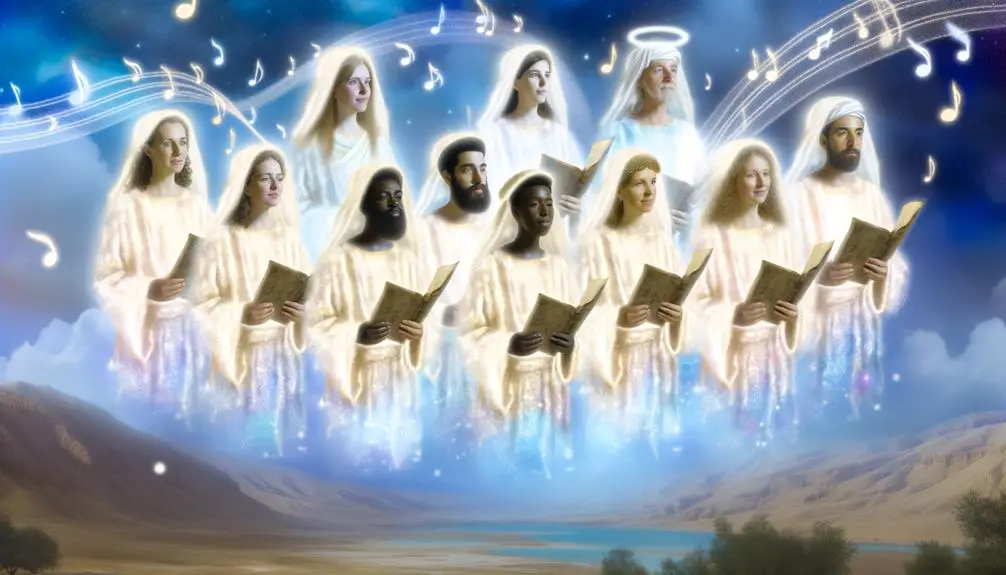Mystery unfolds as we explore if angels truly sing in the Bible, revealing surprising insights and theological interpretations.

Do Angels Sing in the Bible
Have you ever wondered if angels sing in the Bible? This question opens up a fascinating exploration into the realm of angelic beings and their depiction in scripture.
You might find it intriguing that while popular culture often portrays angels with harps, singing celestial melodies, the biblical text presents a more nuanced picture. The concept of angelic voices does appear, but the context and implications might surprise you.
As we unpack the biblical references and analyze key passages, you'll discover the rich tapestry of interpretations and theological perspectives surrounding angelic songs. Let's embark on this journey to uncover what scripture really says about the voices of angels.
Key Takeaways
- Angelic beings are often depicted as messengers and worshippers, but not always specifically described as singing in the Bible.
- Biblical references to angelic voices primarily highlight their role in conveying divine messages and praising God, rather than singing.
- The concept of celestial choirs and angelic music is more a theological interpretation than a direct scriptural assertion.
- While angels play significant roles in scripture, including guidance and protection, their acts of worship do not explicitly detail singing.
The Concept of Angelic Beings

Exploring the concept of angelic beings reveals a complex hierarchy and diverse roles within various religious texts, offering insight into how these entities are perceived as intermediaries between the divine and the human realm. Angel appearances and their roles as divine messengers stand out as significant components of this intricate structure. You'll find that these celestial beings aren't just messengers but also serve as guides, protectors, and executors of divine will, embodying the connection between heaven and earth.
The notion of angelic beings as divine messengers is deeply embedded in religious lore. Their appearances often signify moments of great importance, where divine messages need to be delivered to humans directly. These moments are pivotal, not only in the narratives within which they occur but also in shaping the understanding of divine interaction with the human world. The roles angels play underscore their significance as conduits of the divine will, tasked with communicating messages of profound spiritual, ethical, and sometimes even eschatological significance.
Analyzing these angelic interventions offers a glimpse into the way divine will is manifested within the human realm. It's not merely about the messages they deliver but also about the manner of their appearance and interaction with humanity. These aspects collectively highlight the multifaceted roles of angelic beings as both messengers and active participants in the divine plan. Thus, understanding angel appearances and their function as divine messengers enriches the comprehension of their place within the cosmic order, bridging the gap between the celestial and the terrestrial.
Biblical References to Angelic Voices

Numerous instances in the Bible depict angels' voices as a powerful medium for conveying divine messages to humanity. This communication often takes the form of heavenly harmonies or celestial choirs, emphasizing the spiritual and ethereal nature of these beings. For example, in the Book of Luke, angels announce the birth of Jesus to shepherds with a chorus of praise, suggesting not only their role as messengers but also their capacity to produce harmonious sounds that inspire awe and reverence.
Further analysis of scriptural texts reveals that angelic voices serve multiple purposes. They're not merely for proclamation; they also function as a means of worship and adulation towards the divine. In the Book of Revelation, John describes a vision of angels surrounding the throne of God, singing in a manner that signifies unity and devotion. This depiction aligns with the concept of celestial choirs, where angelic beings are organized in a hierarchical structure, each group praising God in perfect harmony.
The references to angelic voices in the Bible, therefore, extend beyond simple communication. They encapsulate the essence of heavenly worship, illustrating a profound connection between the divine and the celestial. Through these descriptions, one gains insight into the multifaceted roles of angels in biblical narrative, not just as messengers, but as participants in the eternal chorus of divine worship.
Misconceptions and Interpretations

Despite the vivid biblical depictions of angels' voices, there's a wide range of misconceptions and varied interpretations surrounding their nature and significance. You might find it intriguing how celestial myths and interpretations about angelic silence often diverge from the scriptural narratives, leading to an enriched yet complex understanding of these heavenly beings.
Misconception |
Reality |
Impact on Interpretation |
|---|---|---|
Angels are always depicted singing |
Rare explicit mentions |
Skews perception of angelic roles |
Angelic silence denotes absence |
Often means presence |
Misunderstood spiritual symbolism |
All angels have similar roles |
Roles are diverse |
Oversimplification of scripture |
Angels' voices are human-like |
Described as unique |
Misinterpretation of their nature |
Celestial myths are scriptural |
Often are not |
Blurs the line between fact and fiction |
In dissecting these misconceptions, it's essential to approach the topic with an analytical mindset. The belief in angelic choirs, for instance, while comforting, isn't heavily supported by scripture. This gap between belief and textual evidence showcases how celestial myths have permeated our understanding of angels, often overshadowing the nuanced depiction in biblical texts. Similarly, interpreting angelic silence as mere absence rather than a profound presence reflects a surface-level engagement with these complex spiritual entities.
Understanding the layered interpretations and correcting misconceptions require a careful examination of scripture, distinguishing between cultural embellishments and scriptural truths. By doing so, you'll gain a deeper appreciation of the multifaceted roles and presentations of angels in biblical contexts, free from the distortions of popular myths.
The Role of Angels in Scripture

Angels often serve as messengers and intermediaries between the divine and humanity in biblical scripture, embodying a range of roles that underscore their significance in religious texts. Their angelic duties and heavenly appearances offer a glimpse into the celestial workings and highlight their importance in the spiritual narrative.
Understanding the multifaceted roles of angels in scripture requires a dive into their primary functions:
- Guidance and Protection: Angels are depicted as guardians, guiding and protecting individuals and nations according to divine will. Their presence reassures the faithful of God's care and intervention in human affairs.
- Messengers of God: Perhaps the most recognized role, angels act as divine messengers. They deliver God's messages to humans, often bringing revelations, warnings, or comfort. These messages can alter the course of history or deeply impact an individual's life path.
- Executors of Divine Will: Angels implement the judgments or decrees issued by God. This includes enacting punishments, delivering rewards, and participating in the supernatural battles between good and evil.
- Worshippers and Praise Givers: Without delving into whether they sing, it's clear that angels engage in the worship of God. They're often depicted in scripture as surrounding God's throne, offering praise.
These roles, among others, illustrate the depth of angelic involvement in the biblical narrative. Their heavenly appearances and duties not only serve to bridge the gap between the divine and the earthly but also to manifest the complexities of divine intervention and support in the lives of believers.
Analyzing Key Biblical Passages

To fully appreciate the role of angels in the Bible, it's essential to delve into specific passages that illuminate their divine functions and interactions with humanity. These texts often reveal angels engaging in acts that contribute to a sense of heavenly harmony, interpreting their actions and pronouncements as part of a divine choir that communicates God's will and glory to people.
One of the most vivid portrayals of angels participating in celestial music is found in the book of Revelation. Here, John the Apostle describes seeing and hearing multitudes of angels around the throne of God, proclaiming praise in a manner that suggests a highly organized, harmonious ensemble. This depiction emphasizes the angels' role in sustaining an environment of worship and adulation towards the Creator, aligning with the concept of a divine choir.
Similarly, in the book of Luke, angels announce the birth of Jesus to the shepherds with what many interpret as a song, bringing the message of peace and goodwill from heaven to earth. This event not only highlights the angels' role as messengers but also suggests their ability to create a bridge between the divine and the human through their melodic declaration, enhancing the theme of heavenly harmony.
Analyzing these key biblical passages, it becomes evident that while the text may not always explicitly state 'angels sing,' their actions and the context in which they're presented strongly imply their participation in a form of divine choir. This portrayal enriches our understanding of angels, positioning them as integral contributors to the celestial worship and communication between heaven and earth.
Theological Perspectives on Angelic Songs

Within the realm of theology, perspectives on angelic songs vary significantly, reflecting diverse interpretations of their role and significance in biblical narratives. You'll find that theologians and scholars dissect these narratives to understand the essence of angelic music, considering both its literal and metaphorical implications. This scholarly inquiry into angel harmony and celestial choirs uncovers a tapestry of beliefs about how these divine messengers interact with humanity and the cosmos through song.
The theological perspectives can be broadly categorized as follows:
- Symbolic Interpretation: Some theologians argue that angelic singing represents a symbolic communication method, transcending human language to convey divine truths directly to the soul.
- Manifestation of Glory: Others view these celestial choirs as a manifestation of God's glory, with angel harmony serving as a cosmic expression of praise and worship that reflects the perfection of the divine.
- Eschatological Significance: In certain theological frameworks, angelic songs are seen as eschatological signs, heralding the end times or significant divine interventions in human history.
- Intercessory Role: There's also a belief that angelic music plays an intercessory role, with angels singing to intercede on behalf of humanity, bridging the gap between the divine and the mortal.
This analytical exploration into the theological underpinnings of angelic songs reveals a complex and nuanced understanding of their role in biblical texts. It shows that angel harmony and celestial choirs aren't just background elements in sacred narratives but are imbued with deep theological significance, reflecting a myriad of beliefs about the divine, the cosmos, and humanity's place within it.
Frequently Asked Questions
How Has the Depiction of Angels Singing Influenced Modern Music and Cultural Expressions?
The depiction of angels singing has deeply influenced modern music and cultural expressions. You'll find its impact across various musical genres, from classical compositions to contemporary pop.
Choir dynamics, especially, echo the harmonious and ethereal qualities often associated with angelic choirs. This imagery enriches the emotional depth and spiritual dimension in music, allowing artists to weave in themes of transcendence, hope, and divine inspiration, which resonates widely with audiences.
Can Angels Choose Not to Sing, and if So, What Are the Implications of Their Silence?
When exploring angelic autonomy, the concept that angels can choose not to sing introduces the idea of silent rebellion. This choice suggests a profound level of independence and possibly a form of protest or dissent within their ranks.
The implications of their silence could signify disagreement or a strategic choice to communicate in ways beyond human understanding.
Analyzing this aspect sheds light on the complexity and depth of angelic beings in theological discussions.
Are There Any Historical Records Outside the Bible That Corroborate the Idea of Angels Singing?
As the saying goes, 'Truth is stranger than fiction,' when you delve into historical records, you won't find concrete evidence of angelic artifacts or mentions in singing mythology that directly corroborate angels' singing as described in biblical contexts.
While angelic figures do appear across various cultures, their roles are diverse, and the specific act of singing isn't universally documented.
This intriguing absence invites a deeper analysis of angelic representations in historical records.
How Do Different Religious Traditions Outside of Christianity Interpret the Concept of Angels and Their Ability to Sing?
Exploring how various religious traditions conceptualize angels and their melodious abilities, you'll find Islamic perspectives and Hindu mythology offer unique insights.
In Islam, angels are known for their obedience and praise of God, often depicted as reciting divine words rather than singing.
Hindu mythology, however, is rich with celestial beings like Apsaras who enchant with their singing and dancing, highlighting a more artistic expression.
These interpretations showcase the diverse spiritual narratives surrounding angelic beings.
In What Ways Have Scientific Perspectives Attempted to Explain or Debunk the Notion of Angelic Singing?
You've likely wondered if there's a scientific basis for angelic singing. Researchers delve into this using quantum theories and acoustic ecology, seeking patterns or explanations in nature's sounds that might resemble this phenomenon.
Quantum theories explore the possibility of dimensions where such events could exist, while acoustic ecology examines how sound interacts with the environment.
These approaches aim to objectively analyze if there's a scientific ground for what's often considered a supernatural occurrence.
Conclusion
In conclusion, while the Bible teems with references of angels acting as messengers and warriors, their vocal expressions, particularly singing, are less explicitly depicted. This invites a nuanced exploration beyond literal interpretations.
'Actions speak louder than words,' and perhaps, in scripture, the deeds of angels resonate more profoundly than any celestial melody could. Analyzing these passages reveals a rich tapestry of theological insights, emphasizing the multifaceted roles angels play in the divine narrative, transcending mere vocal harmonies.



Sign up